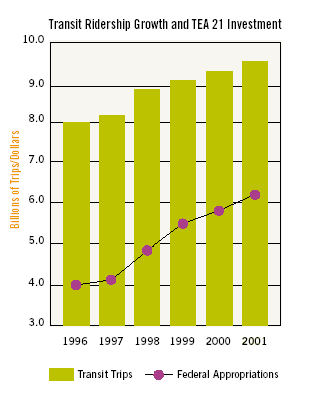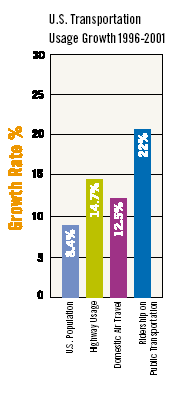TEA 21 Reauthorization Proposal
Click here to download this brochure in PDF format.
Investment in public transportation is paying off for
America.
The Intermodal Surface Transportation
Efficiency Act (ISTEA) in 1991 enhanced local transportation
decision-making and provided significant stimulus to surface
transportation programs. Reauthorized as the Transportation
Equity Act for the 21st Century (TEA 21) in 1998, this
landmark legislation has spurred successful public
transportation projects and programs around the country. The
result? In the last six years alone, public transportation use
has risen 22 percent—faster than growth in vehicle miles
traveled on our roadways and airline passenger miles logged
over the same period. In 2001, Americans used public
transportation 9.5 billion times—the highest ridership in more
than 40 years.
But more investment is needed.
Our nation’s roadways have become
increasingly congested with traffic, our security needs have
assumed heightened importance, and conserving energy and
protecting the environment have become priorities. An
efficient and balanced multimodal transportation system is
essential to ensure the nation’s economic productivity and
safety, as well as a healthy, productive quality of life for
all Americans.
Let’s build on the TEA 21 record of success and keep
America moving.
Reauthorizing TEA 21 surface transportation programs —
at the highest levels — is critical to sustain and advance the
U.S. renaissance in public transportation.
TEA 21 Reauthorization: An Investment in
America
Because personal mobility and freedom are
vital to our nation, APTA envisions a transportation system in
which all modes function together to provide safe, secure,
reliable mobility—and mobility choices—to an ever-growing and
ever-changing traveling public. Public transportation should
continue to play a key role in achieving national policy
goals. Reauthorization of TEA 21 is critical to making this
happen.

The Goal
-
Provide greater transportation choices for all Americans
by the end of this decade.
-
Improve and expand public transportation services so that
all Americans have the freedom to travel where and when they
please.
The Policy
Our national transportation policy should
include:
-
Safe, secure, reliable mobility options. Create an
integrated, balanced transportation system.
-
Access to economic and social opportunities.
Provide all Americans, from all walks of life, the
opportunity to enrich their lives and communities through
expanded public transportation.
-
Economic growth, reduced traffic congestion.
Invest in the development of transportation system
capacity to stimulate the economy and reduce traffic
congestion and its adverse effects on families, economic
productivity and the environment.
-
Recognition of public transportation’s role in
reaching critical national policy goals.
Achieve
stronger national security, cleaner air, better health,
reduction of our dependency on foreign oil, more educational
opportunities and a host of other national goals through
public transportation investment.
-
Significant increases in investment for highways and
public transportation.
Build on the success of TEA
21 and ISTEA to greatly expand investments in surface
transportation.
Investment Levels and Programs for TEA 21
Reauthorization: Recommended Principles
 To guide investment levels and programs
for TEA 21 reauthorization, APTA recommends the following
principles:
To guide investment levels and programs
for TEA 21 reauthorization, APTA recommends the following
principles:
-
Preserve a strong and growing federal investment in the
surface transportation system.
-
Retain the basic principles of TEA 21, including a
needs-based transit program.
-
Retain firewalls and guaranteed funding for the transit
and highway programs.
-
Continue growing the transit program to meet growing
investment needs.
-
Preserve and enhance the flexibility provided for highway
and transit programs under TEA 21.
-
Maintain current matching shares for transit and highway
programs as authorized under TEA 21.
-
Grow the program, first holding harmless TEA 21’s FY 2003
funding levels and program structure, including
Disadvantaged Business Enterprise (DBE) and other critical
programs.
-
Strongly support efforts to coordinate transportation
policies of the nation’s human and social service programs
with federal transportation policy and funding
programs.
Program Growth Proposal: Double Federal
Transit Program by 2009
With documented investment needs in excess of
$43 billion per year, APTA recommends doubling the annual
federal transit program to $14.3 billion by FY 2009.
Federal Transit Program Funding
Recommendations
All existing programs should have a base,
held-harmless, funding level at their FY 2003 TEA 21
guaranteed level. Grow the guaranteed transit funding at 12
percent per year above the FY 2003 TEA 21 guaranteed level.
The ratio of total formula funds divided by total capital
investment funds should be no less than 1.15 to 1.00.
Funding growth in excess of the FY 2003 TEA 21 guaranteed
level of $7.2 billion should generally be distributed as
follows:
-
Approximately 55% to additional funding for all TEA 21
programs funded in FY 2003 in proportion to their FY 2003
TEA 21 guaranteed funding level.
-
Approximately 5% to address the special investment needs
of smaller cities and rural areas.
-
Approximately 18% for additional funding for the New
Starts program.
-
Approximately 18% for additional funding for the
Fixed-Guideway Modernization program to be allocated under a
new Tier 8 at 60% for "old" fixed-guideway communities, 40%
for "new" fixed-guideway communities.
-
Approximately 4% for additional funding for the Bus
Capital program.
-
Funding increases provided for five research and
education programs totaling $15.6 million in FY 2004 and
increasing $6.3 million each subsequent year.
-
The sum of funding for metropolitan planning and state
planning to be equal to 1.0 percent of the total funding for
all programs.
Average Annual Cost to Improve Physical
Conditions and System Performance
|
|
In Billions |
|
Replacement/rehabilitation of Existing Fleet |
$5.6 |
|
Replacement/rehabilitation of other Transit Assets
|
$5.1 |
|
Expansion of Vehicle Fleet and other Transit Assets
to Accommodate Ridership Growth and Improve Performance
|
$33.2 |
|
Total |
$43.9 |
Source: Cambridge Systematics, Inc. (June 2002)
Recommendations on Policies and
Procedures
Expediting Program Delivery. From
streamlining the drug- and alcohol-testing program to
simplifying the charter bus rule, APTA recommends a host of
changes that would significantly simplify and improve existing
federal program mechanisms including proposals to:
-
Coordinate and consolidate federal reviews and audits
-
Require notice and comment for FTA policy statements
-
Make permanent the bus axle weight limitation
exemption
-
Simplify rural and small transit system programs
-
Extend the emergency relief authority available under the
highway program to the transit program
Improving the Planning Process. A range of proposals
would seek a level playing field for highway and transit. The
proposals would:
-
Strengthen metropolitan planning organizations (MPOs)
-
Improve public involvement
-
Support use of major investment studies (MISs)
-
Consolidate planning factors
-
Encourage land use/transit linkage
-
Improve the New Starts criteria and rankings
Streamlining the Procurement Process.
APTA proposes new ways to simplify federal procurements,
including providing transit systems the option of buying goods
and services from the GSA schedule of contracts. Further,
costly in-state dealership requirements for the purchase of
buses should be eliminated.
Revising other Federal Programs. From the highway
program to the tax code, a number of proposals would bring
significant improvements to other federal programs affecting
transportation policy.
These include:
-
Enhancement of FHWA’s flexible funding programs
-
Extension of the transit commute benefit to all workers,
provided at the same level as the parking benefit
-
Enhanced coordination of human services with
transportation policies
This brochure presents a summary of APTA’s
TEA 21 Reauthorization Proposal as adopted by the APTA Board
of Directors on September 22, 2002.
For further details and updated information, please visit
www.apta.com or contact us at:
American Public Transportation Association
1666 K
Street, N.W.,
Washington, DC 20006-1215
Phone: 202-496-4800
Fax:
202-496-4324




